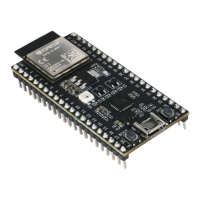Chapter 4. API Guides
void RTC_IRAM_ATTR esp_wake_deep_sleep(void) {
esp_default_wake_deep_sleep();
// Add additional functionality here
}
The second way is to place the function into any source file whose name starts with rtc_wake_stub. Files names
rtc_wake_stub* have their contents automatically put into RTC memory by the linker.
The first way is simpler for very short and simple code, or for source files where you want to mix “normal”and
“RTC”code. The second way is simpler when you want to write longer pieces of code for RTC memory.
4.5.4 Loading Data Into RTC Memory
Data used by stub code must be resident in RTC memory.
The data can be placed in RTC Fast memory or in RTC Slow memory which is also used by the ULP.
Specifying this data can be done in one of two ways:
The first way is to use the RTC_DATA_ATTR and RTC_RODATA_ATTR to specify any data (writeable or read-only,
respectively) which should be loaded into RTC memory:
RTC_DATA_ATTR int wake_count;
void RTC_IRAM_ATTR esp_wake_deep_sleep(void) {
esp_default_wake_deep_sleep();
static RTC_RODATA_ATTR const char fmt_str[] = "Wake count %d\n";
esp_rom_printf(fmt_str, wake_count++);
}
The RTC memory area where this data will be placed can be configured via menuconfig option named CON-
FIG_ESP32S2_RTCDATA_IN_FAST_MEM. This option allows to keep slow memory area for ULP programs
and once it is enabled the data marked with RTC_DATA_ATTR and RTC_RODATA_ATTR are placed in the RTC
fast memory segment otherwise it goes to RTC slow memory (default option). This option depends on the CON-
FIG_FREERTOS_UNICORE because RTC fast memory can be accessed only by PRO_CPU.
The attributes RTC_FAST_ATTR and RTC_SLOW_ATTR can be used to specify data that will be force placed into
RTC_FAST and RTC_SLOW memory respectively. Any access to data marked with RTC_FAST_ATTR is allowed
by PRO_CPU only and it is responsibility of user to make sure about it.
Unfortunately, any string constants used in this way must be declared as arrays and marked with
RTC_RODATA_ATTR, as shown in the example above.
The second way is to place the data into any source file whose name starts with rtc_wake_stub.
For example, the equivalent example in rtc_wake_stub_counter.c:
int wake_count;
void RTC_IRAM_ATTR esp_wake_deep_sleep(void) {
esp_default_wake_deep_sleep();
esp_rom_printf("Wake count %d\n", wake_count++);
}
The second way is a better option if you need to use strings, or write other more complex code.
To reduce wake-up time use the CONFIG_BOOTLOADER_SKIP_VALIDATE_IN_DEEP_SLEEP Kconfig option, see
more information in Fast boot from Deep Sleep.
Espressif Systems 1300
Submit Document Feedback
Release v4.4

